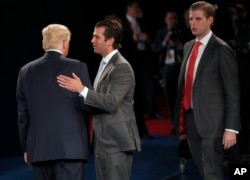Aides to U.S. President-elect Donald Trump say he has decided to name a one-time political foe, former Texas Governor Rick Perry, to head the country’s Department of Energy, a sprawling agency Perry once said should be abolished as wasteful.
Perry, a two-time Republican presidential candidate, called Trump a “cancer to conservatism” in the early stages of the party’s lengthy presidential nominating contest. But after dropping out of the race with scant voter support, the 66-year-old Perry endorsed Trump, saying the New York businessman wasn’t his first or second choice for president, but “is the people’s choice.”
Trump has yet to formally name Perry, who served a record 14 years as governor of Texas, the southwestern state that is the country’s second largest. But the president-elect’s aides said Tuesday he has decided to name Perry to lead the agency that has 100,000 employees, oversees the country’s nuclear-weapons arsenal and promotes development of green-energy projects.
Oil-rich Texas
Perry, a staunch conservative, could shift the Department of Energy away from its recent focus on renewable energy, which President Barack Obama has championed, and back toward oil and fossil fuels, which Perry promoted in oil-rich Texas. Perry has been a vocal skeptic of manmade climate change, but during his tenure as governor turned Texas into a major producer of wind-powered energy.
In 2011, during his first unsuccessful bid for the presidency, Perry committed a political gaffe that diminished his chances in his race against Trump.
During a debate, Perry called for elimination of three federal government agencies - the Departments of Commerce and Education, and then couldn’t remember the third, finally saying, “Oops.” He later said Energy was the third agency he wanted to abolish.
For most of Tuesday, Trump continued to work in New York to fill his Cabinet before his inauguration on January 20, when Obama leaves office after two terms in the White House.
Media reports late Tuesday said Republican Congressman Ryan Zinke of Montana, a former Navy Seal, was believed to be the president-elect’s choice for Secretary of the Interior.
Zinke, described by The Washington Post as a lifelong hunter and fisherman, is a proponent of keeping public lands under federal ownership. That position would put him at odds with those in the Republican Party who favor privatization, or placing federal lands under the control of states.
Trump also has said he does not think public land should be placed under state control.
The Interior Department has more than 70,000 employees across the United States and oversees more than 20 percent of federal land, including national parks.
RNC head
Trump also seemed likely to tap Ronna Romney McDaniel, the Michigan Republican Party chairwoman, as head of the Republican National Committee.
McDaniel is the niece of former Republican presidential candidate Mitt Romney, who had been among those being considered by Trump for the secretary of state post.
Later Tuesday, Trump flew to Wisconsin, the Midwestern state that he narrowly carried over Democrat Hillary Clinton in last month’s election, for another “thank you” rally for supporters.
It was -12 degrees Celsius when Trump landed in Wisconsin. Addressing those who turned out for his rally in the town of West Allis, he discussed many of the same themes as during his campaign.
He also took time to praise the Wisconsin politicians at the rally, including House Speaker Paul Ryan, who represents a district in southern Wisconsin and who has had a rocky relationship with the president-elect.
When the crowd booed the mention of Ryan’s name, Trump rallied the crowd, saying Ryan was “like a fine wine. Every day that goes by I get to appreciate his genius more and more.”
A recount in the state confirmed that the billionaire real estate mogul won the election in the dairy state by a razor-thin margin - the first time a Republican presidential candidate has been victorious there since 1984.
Business decisions
Late Monday, the president-elect used a series of tweets to say he would soon hold a news conference to discuss his Cabinet appointments and the fate of his global business empire when he assumes power. Reporters had been expecting such a meeting with Trump would be held on December 15, but it apparently will be delayed several weeks.
Trump said he will leave management of his hotels, resorts, golf courses and consumer product sales in the hands of his eldest sons, Donald Trump Jr. and Eric Trump, and other executives in order to focus on the presidency and avoid conflicts of interest.
An aide said Monday the president-elect will spell out details sometime in January of how he will separate himself from his Trump Organization operations, and that Trump had pledged “no new deals will be done” during his time in office.
What is not clear is the exact extent to which Trump will remove himself from his companies or what kinds of business actions would fall under the “no new deals” statement.
Ethics experts have said the only way for the president-elect to completely avoid conflicts of interest is to sell his global holdings, but Trump has given no indication he plans to do that and is not required under U.S. law to divest his holdings.
Numerous past U.S. presidents, none of them as wealthy as Trump, have put their assets in blind trusts while in office, with an independent manager handling the assets without the president’s knowledge about what investment decisions are being made.






